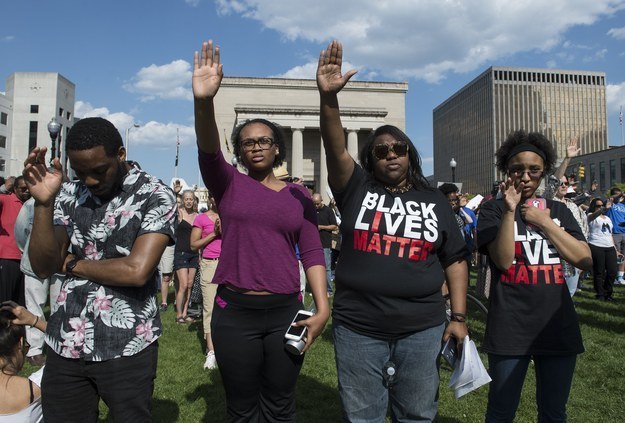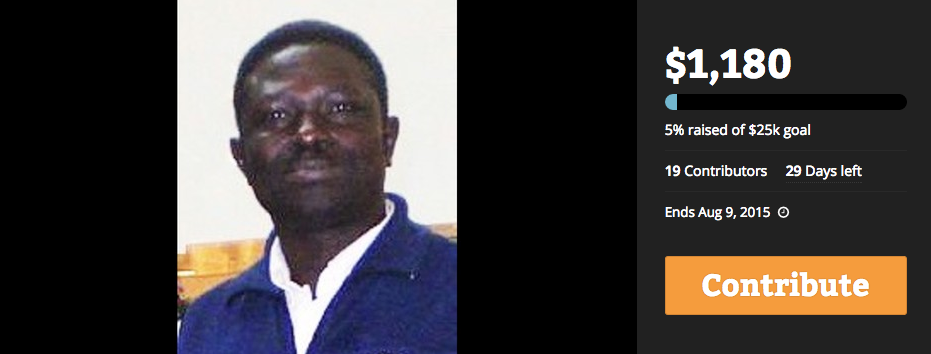In the early hours of July 5, Andrew Loku was shot and killed by Toronto Police in his apartment building in the city's northwest.
Fatal police shooting of #AndrewLoku: 'Andrew didn't even have a chance to open his mouth' http://t.co/4gTnqWV9LQ
Loku, 45, was a father of five, a former child soldier and a refugee of South Sudan, where his wife and children still live. He had recently graduated from the a college construction program and planned for his family to join him in Canada.
He was at his apartment Sunday night, shortly after midnight, when his upstairs neighbours became noisy, neighbour Robin Hicks told CBC News. According to Hicks, Loku went upstairs wielding a hammer, which is when police were called.
Police on scene unknown trouble person armed hammer Eglinton Ave. W. and Gilbert Ave. ^pa
According to Hicks, she managed to get Loku out of the apartment, which is when the police arrived and told him to drop the hammer. A moment later, she said, he was shot.
"I'm not talking five minutes, or two minutes, I'm talking seconds here. We didn't get a word in, me or Andrew," Hicks told CBC.
He was pronounced dead at 12:26 a.m.
Loku had been living in an apartment building with units leased by the Canadian Mental Health Association (CMHA) to provide affordable housing for those with mental illnesses. A statement from the Urban Alliance on Race Relations said Loku had been suffering from mental health issues.
The case is now in the hands of the Special Investigations Unit (SIU), the agency that takes over when police officers are involved in cases of death or serious injury. The SIU does not comment on ongoing cases.
Glass broken on front door of the building on Gilbert Avenue, SIU called in for police involved shooting #Toronto
Loku is not the first person of colour reportedly struggling with mental health issues to be killed by Toronto Police. A coalition of organizations wants the police to start tackling the issue head on.
Hearing from Moses, family of Andrew Loku. They are seeking justice. Sending love to his fam #justice4loku
On Thursday, CMHA and a number of groups, including the African Canadian Legal Clinic, Urban Alliance on Race Relations and Black Lives Matter — Toronto, came together to call on Toronto Police to consider how race and mental illness intersect.
"The idea that they wouldn't be a consideration to me is just absurd," said janaya khan, a spokesperson for Black Lives Matters — Toronto.
"Looking at mental health and racial identities, they’re plural, they’re intersectional," said khan.
"If our policies and our narratives and our understanding of each other is put in silos, it’s not responsible."
A statement from the community groups said that, since 1988, half of those killed by Toronto police while in mental distress were black men. "Overall, racialized people represent 75% of the victims in these tragic incidents."
In 2013, a Toronto police officer shot and killed Sammy Yatim, a teenager from Syria, after he wielded a knife on a streetcar. His death prompted the police to commission a report on the use of force, especially when it comes to those in mental distress. The result was 84 recommendations for the service.
That report, while thorough, failed to examine how race plays a role in these cases, said Roger Love, counsel with the African Canadian Legal Clinic.
"Our position was the report was extensive but colourblind and Toronto Police must make immediate action to apply a racial lens," he told BuzzFeed Canada. In his opinion, the service is slow to move on race issues unless there's significant community pressure.
The coalition has prepared five recommendations to get that work started.
They include:
- A racial analysis of the 2013 report.
- An inquiry into the "disproportionate force used against African-Canadians with mental health issues."
- A review of how officers involved in these cases are disciplined.
- Publicly-released data from the SIU regarding race and mental health.
They're also calling on police to wear body cameras to ensure their side is heard.
"The effect of being unheard is most heavily felt by those who are racialized or experience mental health issues," said Love.
Despite a series of high-profile cases of young black men killed by police in the U.S., Love said the reaction when similar incidents happen in Canada has been disappointingly quiet.

The CHMA confirmed they are in contact with Loku's family and have started a fund to pay for his funeral.

